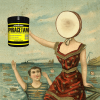I don't get any other withdrawal symptoms from caffeine. just tired.
I would say I had consumption levels around 400mgs a day.
now please lecture me some more about it lol.
I do not know what your profession is but in construction you don't just take a break/siesta at 2.
400mgs was when I was working 12-14 hour days sometimes 7 days a week. its life.
as I said I know it was a high dose
I hope you don't freak out at every person here who has experimented with nootropics in megadoses or those who admit to benzo, ghb, gbl, opiate, amphetamine, etc abuse in the past. There are a lot here.
Let alone those group buys of non-trialed/barely trialed drugs/nootropics lol.
It's unusual not to get withdrawal effects after quitting a 3cups coffee per day habit, but not something to complain about.
If one cannot simply take a generous lunch break, one could prepare at home and transport to work in a glass or steel thermos 3cups worth of tea to be quickly downed when the first signs of tiredness appear. A good way for the overworked to remedy their midday crash.
Harm reduction is a form of "freaking out". I've done my fair share of stupid stuff, including racetams and GPC, vinpocetine (terrible stuff), rhodiola, amphetamine, THC, and LSD...but at some point you have to wisen up, quit taking research chems, like a guniea pig being fed plutonium, it can't be as benign or sustainable as low dose caffeine. A couple years ago I may have joined a group buy, but now it seems risky and I'd rather stick to more proven means, whole plant foods.
Probably all these people should curb their enthusiasm, and wait for mouse studies, as many of these compounds if not harmful, will prove completely useless, not helping or harming anyone's health. So why waste the money and run the risk? They look to things like 7,8-dihydroxyflavone and Dihexa to cure for dementia and depression, C60 for general aging...great if they work and are proven, but they're not proven and won't be proven until there are controlled studies on humans & mice.
[1]There was a finding that guarana caused or may have exacerbate mitral valve prolapse and caused a death. [2]Mitral valve prolapse is a magnesium deficiency and caffeine depletes magnesium (afaik). Of course guarana is a stronger source of caffeine than coffee is, but just proves there's a connection. If you do a google search there are information out there saying coffee is not really good for the heart. Arrythmias and palpitations may lead to mitral valve prolapse, who knows. I'm sure this is dose dependent. [3]It does something to the brain as well.
I know all you coffee lovers would disagree. It's like telling a crackhead cocaine is bad for you, she would disagree. [4]I do miss caffeine, it's only been 2 days since I'm off it. Like I said I'm only experimenting for a week without it. I'm already craving it. i'm not here to change your mind or make you agree with me.
[5]Caffeine being anxiolytic is new to me. [6]It's opposite of that considering your heart is pounding and you're "alert" ready to fight whatever the day brings you. Far from an anxiolytic. That study may have been paid for by the yuppies who own Starbuck's stocks or Dunkin Donut's stock.
[1] That's guano, er Guarana. And you said it caused ONE death? That's a wealth of evidence to pool from, chief. Consider caffeine causes thousands of deaths every year related to arrhythmia, now that's a wealth of evidence.
[2] Mitrial prolapse is not the same thing as magnesium deficiency. Some prolapses may be seriously exacerbated by a magnesium deficiency, if that's the case one should increase dietary intake of magnesium. Magnesium, along with potassium, calcium and vitamin D, is one of the most difficult nutrients to obtain in sufficiency from one's diet without supplementation, and in vegans this is also true of B12; a survey found that less than 1 out of 4 Americans obtained the RDA for magnesium on a daily basis. Good sources of magnesium include pepitas (250mg/100g), boiled quinoa (60mg/100g), boiled brown rice (40mg/100g) & boiled beans (80mg/100g), boiled spinach (80mg/100g), and bananas (30mg/100g). To further aid absorption, don't consume other healthy foods, for example calcium sources, with your magnesium source, give it preference for a whole meal, once a day, allowing the magnesium adaquete time to absorb. "Frequent consumption of alcohol, coffee, food components ie, phytates [beans], phosphorous, fiber, saturated fats, tannins[fruits], polyphenols [tea] can block or decrease mineral absorption." In short, you may have to supplement magnesium, or stuff your face with only the finest foods.
[3] Such a precise statement, chief.
[4]Only two days? Only planning to abstain for a week, then you're reverting to addiction denial and being a caffeine-head? Do as you please, chief.
[5]Perhaps isolated caffeine is more adaptogenic than anxiolytic. The studies with theanine and caffeine though clearly demonstrate a significant anxiolytic effect, that's multiple studies verified and reproduced, multiple universities, different funding sources...hard to deny. Some extremely sharp witted yuppies indeed: "The aim of this study was to compare 50 mg caffeine, with and without 100 mg L-theanine, on cognition and mood in healthy volunteers. The effects of these treatments on word recognition, rapid visual information processing, critical flicker fusion threshold, attention switching and mood were compared to placebo in 27 participants. Performance was measured at baseline and again 60 min and 90 min after each treatment (separated by a 7-day washout). Caffeine improved subjective alertness at 60 min and accuracy on the attention-switching task at 90 min. The L-theanine and caffeine combination improved both speed and accuracy of performance of the attention-switching task at 60 min, and reduced susceptibility to distracting information in the memory task at both 60 min and 90 min. These results replicate previous evidence which suggests that L-theanine and caffeine in combination are beneficial for improving performance on cognitively demanding tasks."
[6]Caffeine is bad for the heart you say? A study of 40,530 Japanese adults found that participants who drank more than five cups of tea a day had a 26% lower risk of heart attack or stroke than those who drank less than one cup of tea a day. Cheers.
Edited by dasheenster, 22 November 2014 - 03:23 AM.



























































